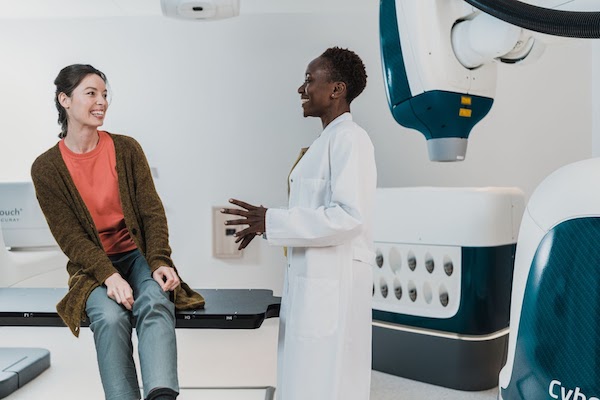When you are ready for support in trying to conceive, in vitro fertilization (IVF) may be a treatment that may help you realize your dream of becoming a parent.
But what if you don’t feel ready to start the IVF conversation?
We understand that going through this process can bring on a rollercoaster of emotions. In this article, we’ll guide you through the initial stages of your IVF journey so that you can embark on your IVF journey confidently and with excitement.
Highlights:
- Educating yourself on IVF
- Taking the necessary tests
- Physically preparing for IVF
- Mentally preparing for IVF
- IVF FAQs
- Starting your IVF journey
If you’re interested in IVF treatment with HRC Fertility, our Dream Plus Package might be for you.
Step 1: Educate Yourself on IVF
There are some steps you’ll want to think about before receiving IVF treatment so you can be best prepared, the first of which is familiarizing yourself with the treatment.
IVF is a medical procedure in which an egg and sperm are combined outside the body and then implanted into the ovaries to help induce pregnancy.
This is of course IVF, put simply, but what goes on throughout this treatment? Let us walk you through it.
What Is The IVF Process?
The IVF process begins with ovulation induction. To make sure ovulation doesn’t happen on its own, you may be given medications like Lupron or Ganirelix. Ovulation won’t occur until the fertility doctor administers a well-timed injection of hCG or LH (luteinizing hormone).
This control over the timing is crucial in guiding the IVF cycle, ensuring it aligns with a carefully managed schedule and giving you peace of mind throughout the process.
IVF, as with any other procedure, can leave you with more questions initially, and that’s okay! A consultation with your specialist team will be the best way to get the most relevant and insightful information on IVF—such as what your IVF shot schedule will look like.
Step 2: Test For Possible Risks and Complications
Before you begin treatment, an IVF physician will order a set of comprehensive medical tests to ensure a smooth procedure.
Both partners will undergo testing, and the most common exams include the following:
- (For Gay Couples) Semen Analysis: Semen evaluation comprises a series of tests aimed at assessing both the quality and quantity of sperm, as well as the seminal fluid containing them.
- Ovarian Reserve Assessment: Antral follicle count (AFC) quantifies the sum of follicles present on both ovaries, while anti-Mullerian hormone (AMH) serves as an additional tool to gauge ovarian reserve.
- Uterine Lining Assessment: Measuring the thickness of the endometrium and ruling out uterine abnormalities is most commonly achieved through uterine lining ultrasound.
- Infectious Disease Screening: The Infectious Blood Test Panel includes evaluations for Hepatitis B Core antibody, Hepatitis B Surface antigen, Hepatitis C antibody, Syphilis, HIV 1 and 2, Chlamydia, and Gonorrhea.
Though it may seem overwhelming, the testing round is a standard and important part of the IVF process. You can rest assured you’re in good hands with us, and the test will be over before you know it.
After this step, you’re ready to begin compiling your IVF preparation checklist.
Step 3: How To Physically Prepare For IVF
A healthy body is a crucial component of IVF preparation.
Before you undergo the treatment make sure you add the following tips to your IVF prep checklist:
- Adopt a nutritious, balanced diet of whole foods like fruits, vegetables, whole grains, nuts, beans, proteins, and eggs.
- Incorporate prenatal vitamins into your daily routine.*
- Maintain a healthy weight.
- Don’t smoke, drink alcohol, or use recreational drugs. These substances can decrease endometrial thickness and increase the risk of implantation failure.
- Be cautious of travel to regions with potential health risks like infectious diseases which could disrupt your treatment schedule.
- Consider cutting caffeine from your diet or limiting your intake to 200 mg per day.
Participating in low-intensity exercises like yoga, walking, swimming, and physical care like acupuncture and massages are other healthy strategies when it comes to aiding with fertility for IVF.

IVF Prep Recommended Vitamins
- Vitamin D: Verify your Vitamin D status to rule out deficiencies, as adequate Vitamin D levels may enhance your body’s response to IVF treatment.
- *Prenatal Supplements: Prenatal vitamins are typically advised for individuals attempting to conceive, ensuring they have essential nutrients for a healthy pregnancy.
- CoQ10 and DHEA: Coenzyme Q10 (CoQ10) and Dehydroepiandrosterone (DHEA) are potential supplements that may be beneficial for egg quality improvement.
Step 4: How To Mentally Prepare For IVF
We know it takes more than just physical preparation; the mind is a powerful thing, and nerves can get the better of us when it comes to something like an IVF journey.

Cultivate Emotional Resiliency
One of the most important things to remember is that while stress is primarily mental, it can have a significant physical impact on your health and your IVF journey. Stress manifests differently for each person, so recognizing your stress triggers and coping mechanisms is essential.
Understanding where your stress may originate — whether it’s related to clinic visits, injections, etc — can help you develop strategies for managing it. Practice techniques for managing stress and anxiety, such as deep breathing, mindfulness, or meditation.
These strategies can be invaluable before, during, and after your IVF treatment.
Manage Expectations For Your IVF Journey
Before your appointment, discuss your hopes and expectations with your partner. Consider how you both envision your roles during the IVF process and any support you may need from each other.
Focus On Positivity
Positivity can be the best medicine. Even recognize the power of humor as a coping mechanism and find moments of levity and laughter in the journey.
One of our Board Certified Reproductive Endocrinologists speaks about how important it is to have a positive outlook before and during the IVF fertility process:
“I encourage all patients moving into a fertility journey to align themselves with their most positive potential.” – Alison C. Peck, MD, FACOG
IVF Prep FAQS
Preparing for IVF is easier with a mind clear of concerns. Here are some of the most commonly asked questions regarding IVF treatment.
How Successful Is IVF?
While IVF success rates decline with age, HRC Fertility is proud to report IVF success rates of:
- 55% for women under 35
- 49% for women aged 35 to 37
- 39% for women aged 38 to 40
- 24% for women aged 41+
30+ years of using world-class assisted reproductive technology and working with compassionate and experienced medical professionals have helped us give aspiring parents a chance at parenthood.
How Many Injections Are Required For IVF Treatment?
The number of IVF injections required will vary depending on the individual’s needs. Typically, an IVF shot schedule includes 1-2 daily injections. No one is eager to undergo injections, but the good thing about IVF is that you only need shots for 10-14 days.
How Long Is The IVF Process?
Like the number of injections, the IVF journey is different for everyone.
Typical cycles can take anywhere from 4-6 weeks, but some patients may require additional time for a safe and successful treatment. The important thing to remember is our professionals are there with you every step of the way to ensure a safe treatment.
Start Your IVF Journey At HRC Fertility
It’s completely normal to be nervous before an appointment. Fortunately, IVF has opened doors to parenthood for countless couples who once faced infertility challenges.
Schedule your appointment today with our team of fertility specialists in California and let’s make your dreams a reality.

